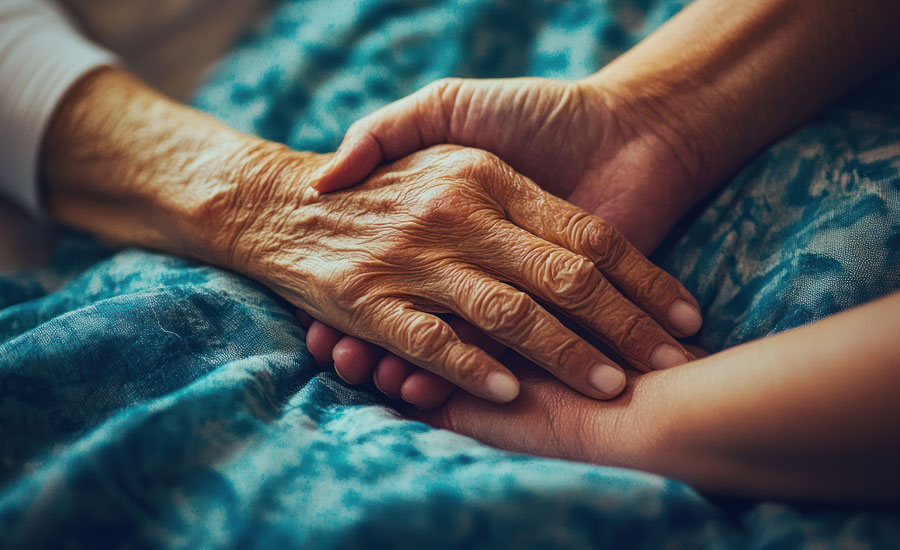A Guide to End-of-Life Care in Care Homes

End-of-life care is one of the most sensitive and important aspects of choosing a care home. Families want to know their loved ones will be treated with dignity, comfort and compassion during this critical time.
Understanding the options available can feel overwhelming. That’s why we’re here to help you explore the main end-of-life care services offered in homes, their benefits and what families should consider when making this decision.
What Are the End-of-Life Care Options in Care Homes?
Care homes offer various end-of-life services, such as:
- Pain and symptom management – Modified medical care to relieve discomfort and manage symptoms like nausea and breathlessness.
- Emotional and psychological support – Access to counsellors and therapy sessions for residents and families.
- Religious care – Chaplaincy services or support aligned with the resident’s faith and beliefs.
- Advanced care planning – Personal care plans developed with residents and families to honour wishes.
- Family involvement – Extended visiting hours, overnight accommodations and open communication to keep families close.
- Coordination with hospice services – Collaboration with external hospice teams for more specialised care.
- Bereavement support – Therapy and resources for families after a loved one’s passing.
- Creating a familiar environment – Personalised spaces and routines allow residents to feel secure and at peace.
In more detail:
Keeping Residents Comfortable
Managing pain and symptoms is a top priority for staff working in end-of-life care. Whether relieving discomfort, including being unable to breathe or sickness, care homes use personalised approaches to make residents feel at ease. Regular check-ins and adapted treatment plans ensure every resident’s physical comfort is front and centre.
Providing Emotional Support
End-of-life care is as much about emotional well-being as it is about physical health. A good care home will offer access to mental health services for both residents and families. Safe spaces allow everyone to process their feelings, find comfort and get through this deeply personal journey together.
Honouring Religion
Spiritual support is incredibly personal and care homes specialising in end-of-life care are mindful of respecting every resident’s beliefs. Whether arranging a visit from a vicar, supporting moments of prayer or meditation or being present for meaningful conversations, spiritual care brings much-needed peace and solace.
Planning with Families
Advanced care planning puts residents and their families at the heart of decision-making. From treatment preferences to personal routines, care homes collaborate with loved ones to create a plan that reflects what truly matters, ensuring every decision honours the resident’s values and wishes.
Keeping Family Close
Family presence is of utmost importance during this time, with many care homes offering extended visiting hours, private spaces for precious moments of connection and even options for overnight stays. It’s about making sure families can be there, offering love and comfort when it matters most.
Specialist Support from Hospice Teams
Care homes often work with hospice providers for more complex needs, bringing specialist expertise into the home environment. This vital partnership ensures residents can access advanced palliative care without the stress of moving out of the care home.
Support for Families Afterward
Many homes give bereavement support, from counselling to practical resources. Some care homes help families cope with their loss and find their way through the grieving process with guidance and compassion because care doesn’t stop after a loved one passes.
Creating a Familiar Environment
Many care homes go the extra mile to create a comforting and familiar setting for residents during end-of-life care. Personalised rooms with meaningful belongings and consistent caregivers to build trust and calm, quiet spaces create familiarity and routine to help residents feel secure and at peace, especially during this difficult time.
The Benefits of End-of-Life Care in Homes
Choosing a care home that specialises in end-of-life care provides a host of unique benefits, such as:
1. A Calm and Comfortable Atmosphere
Unlike clinical settings, homes provide a warm, homely environment. Personalised rooms, familiar routines and trusted caregivers help residents feel secure and relaxed during this phase.
2. Family-Centered Approach
Care homes prioritise family involvement, offering private spaces for visits, overnight stays and opportunities to participate in care, creating a supportive setting for getting as many shared moments as possible.
3. Specialised Staff Training
Care staff are often explicitly trained in end-of-life care, allowing them to properly address physical, emotional and religious needs with skill and compassion.
4. Continuity of Care
Staying in a care home means residents avoid the disruption of moving to another facility for palliative care. Familiar staff and surroundings reduce stress for residents and their families.
5. Multidisciplinary Support
Care homes work closely with professionals like nurses, therapists and priests, creating a team-based approach to end-of-life care. Holistic support ensures every aspect of a resident’s well-being is covered.
6. Opportunities for Legacy and Reflection
Homes allow residents to reflect on their lives and create meaningful memories with their loved ones. Activities like memory books, sharing stories or special family meals bring purpose and peace.
7. Practical and Emotional Guidance for Families
In addition to providing bereavement support, some care homes guide families through practical matters like care decisions and funeral arrangements, easing the burden during an already difficult time.
8. A Personalised Approach to Every Resident
Each resident is treated individually, with care plans tailor-made to their requirements, preferences and beliefs, ensuring end-of-life care is as personal, meaningful and effective.
Making the Right Choice for End-of-Life Care
Getting to grips with the end-of-life options available helps you make choices that truly align with your loved one’s needs and wishes.
It’s important to ask questions and feel confident in your decisions. The right environment can make all the difference during this sensitive time, offering the best care while allowing for meaningful moments and treasured memories.
Ready to explore...
